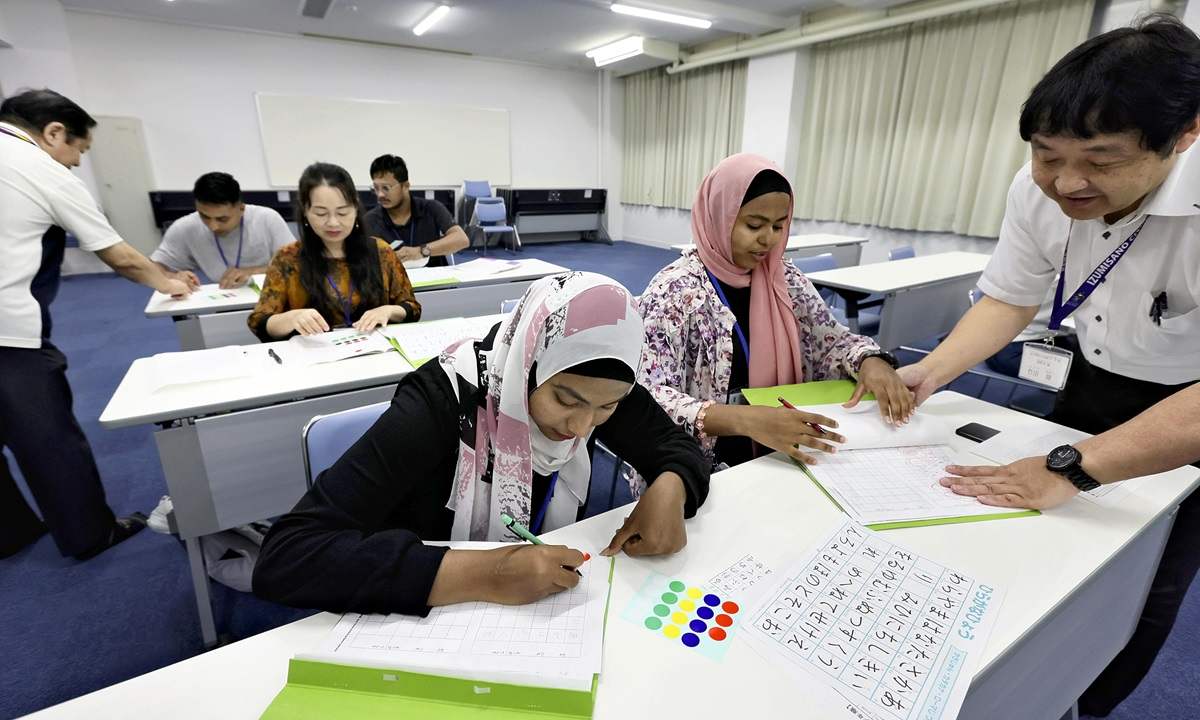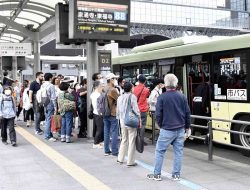Ministry Eyes Improving Night-School Japanese Lessons; Aim Is To Help Foreigners Complete Junior High School

Foreign students learn Japanese at an evening-class junior high school in Izumisano, Osaka Prefecture, on Sept. 24.
21:00 JST, November 16, 2024
The education ministry aims to make new guidelines, starting next fiscal year, for teaching the Japanese language to foreign nationals who attend evening classes of junior high schools in Japan.
The Education, Culture, Sports, Science and Technology Ministry plans to compile effective teaching methods to improve such classes.
Junior high schools that offer evening classes are for people who did not finish compulsory education courses.
Students who complete all required courses, given by licensed teachers, can obtain junior high school diplomas in Japan.
As of April 2024, there were 53 such junior high schools in 24 of Japan’s 47 prefectures, including Tokyo. The government has presented a goal of setting up evening-class junior high schools in all prefectures and ordinance-designated major cities by fiscal 2027.
Those who attend this kind of junior high school also include Japanese people who could not complete their compulsory education for such reasons as not attending school. But nearly 70% of night school students are foreign nationals.
Many of those foreign students hope to learn Japanese. How to assist them has been a topic of consideration.
Teacher’s license categories for junior high school in Japan do not include one specializing in teaching Japanese to foreign students.
The current reality is that Japanese language classes for foreign students are taught not only by teachers of “national language” classes but also teachers of other subjects, including social studies and mathematics.
To make the guidelines, the education ministry plans to conduct fact-finding surveys on evening-class junior high schools about Japanese language class curriculums, teaching materials and class compositions.
There are areas where evening-class junior high schools tie up with Japanese language schools in their local communities. Foreign nationals first receive beginner-level Japanese language education at the latter and then enroll in the former. The ministry plans to research such cases.
Based on the survey results, the ministry will compile the guidelines about effective teaching methods and then advise evening-class junior high schools nationwide.
The number of foreign residents in Japan increased from 2.07 million in 2013 to 3.41 million in 2023, marking an increase of about 60% over a decade.
Related Tags
Top Articles in Society
-

Producer Behind Pop Group XG Arrested for Cocaine Possession
-

Man Infected with Measles Reportedly Dined at Restaurant in Tokyo Station
-

Man Infected with Measles May Have Come in Contact with Many People in Tokyo, Went to Store, Restaurant Around When Symptoms Emerged
-

Woman with Measles Visited Hospital in Tokyo Multiple Times Before Being Diagnosed with Disease
-

Australian Woman Dies After Mishap on Ski Lift in Nagano Prefecture
JN ACCESS RANKING
-

Producer Behind Pop Group XG Arrested for Cocaine Possession
-

Japan PM Takaichi’s Cabinet Resigns en Masse
-

Man Infected with Measles Reportedly Dined at Restaurant in Tokyo Station
-

Israeli Ambassador to Japan Speaks about Japan’s Role in the Reconstruction of Gaza
-

Videos Plagiarized, Reposted with False Subtitles Claiming ‘Ryukyu Belongs to China’; Anti-China False Information Also Posted in Japan























